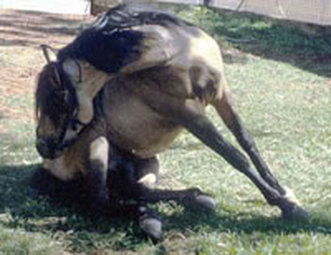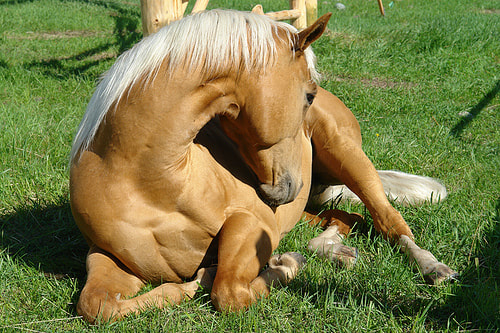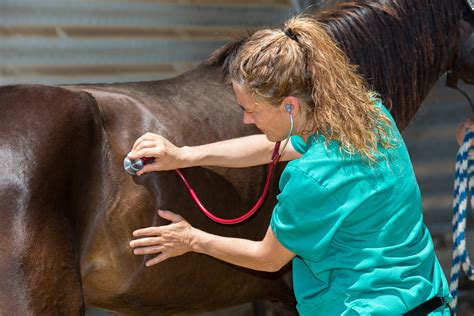
What is Colic?
Colic is very common in horses and includes a number of conditions. Basically colic is pain in the belly. This normally refers to pain in the intestines and/or stomach, but can occasionally include the kidney, liver, bladder or reproductive organs. Sometimes horses with a muscle condition called recurrent exertional rhabdomyolysis can present like colic.
Fortunately 80% of these are ‘simple colics’ referring to the gut and can be treated medically rather than surgically.
What are the signs of colic?
Signs of colic are associated with abdominal pain. This may include kicking or biting at the abdomen, flank watching, laying down and getting up repeatedly, pawing, decreased faecal output, inappetance, rolling frequently and generally looking uncomfortable.
Which horses are at risk?
A number of things can put a horse at risk of experiencing intestinal colic:
- Previous Colic: If a horse has previously had colic, it is at increased risk of experiencing it again.
- Breed: Even though all breeds of horses are at risk, Arabians and Thoroughbreds seem to be at increased risk.
- Diet: This is another component which can play a role in colic. Coarse roughage with low digestibility can lead to impaction colic, while high grain diets or a sudden change in feed can also lead to colic. Feeding horses on the ground or stabling on sand can put them at risk of experiencing sand colic.
- Parasites: Worms can also cause colic, particularly in young horses. It is possible for a horse who is regularly wormed to have a parasite issue if there is resistance. Chat to one of our vets about which product is best and how frequently it should be used. Generally in the more tropical regions, it is more important to worm during wet periods
My horse has signs of colic. What can my vet do?
A vet is essential to start treatment for your horse. The vet will examine your horse and using measurements such as heart rate, gum colour, gut sounds and level of pain, to help them determine the severity of the colic and what treatment is needed. The vet may also check a blood marker known as ‘lactate’ which is useful to determine the severity of the condition, chance of survival and response to treatment.
What treatment is given for colic?
Depending on the severity of the colic, the vet will give pain relief and assess the horse's response. Often a stomach tube is passed via the nose to the stomach, this assists in releasing pressure in the stomach, assessing reflux (whether there is vomit) and also allows us to administer fluids into the gut, as well as other treatments such as paraffin oil or magnesium sulfate if needed. This is a specialised treatment that only vets should perform. If the treatments go into the lungs instead of the gut, it can be fatal.
Often this is all that is needed. In some cases treatments will need to be repeated every few hours. In some cases, surgery is required. In some cases, intestinal colic is fatal.
Colic is very common in horses and includes a number of conditions. Basically colic is pain in the belly. This normally refers to pain in the intestines and/or stomach, but can occasionally include the kidney, liver, bladder or reproductive organs. Sometimes horses with a muscle condition called recurrent exertional rhabdomyolysis can present like colic.
Fortunately 80% of these are ‘simple colics’ referring to the gut and can be treated medically rather than surgically.
What are the signs of colic?
Signs of colic are associated with abdominal pain. This may include kicking or biting at the abdomen, flank watching, laying down and getting up repeatedly, pawing, decreased faecal output, inappetance, rolling frequently and generally looking uncomfortable.
Which horses are at risk?
A number of things can put a horse at risk of experiencing intestinal colic:
- Previous Colic: If a horse has previously had colic, it is at increased risk of experiencing it again.
- Breed: Even though all breeds of horses are at risk, Arabians and Thoroughbreds seem to be at increased risk.
- Diet: This is another component which can play a role in colic. Coarse roughage with low digestibility can lead to impaction colic, while high grain diets or a sudden change in feed can also lead to colic. Feeding horses on the ground or stabling on sand can put them at risk of experiencing sand colic.
- Parasites: Worms can also cause colic, particularly in young horses. It is possible for a horse who is regularly wormed to have a parasite issue if there is resistance. Chat to one of our vets about which product is best and how frequently it should be used. Generally in the more tropical regions, it is more important to worm during wet periods
My horse has signs of colic. What can my vet do?
A vet is essential to start treatment for your horse. The vet will examine your horse and using measurements such as heart rate, gum colour, gut sounds and level of pain, to help them determine the severity of the colic and what treatment is needed. The vet may also check a blood marker known as ‘lactate’ which is useful to determine the severity of the condition, chance of survival and response to treatment.
What treatment is given for colic?
Depending on the severity of the colic, the vet will give pain relief and assess the horse's response. Often a stomach tube is passed via the nose to the stomach, this assists in releasing pressure in the stomach, assessing reflux (whether there is vomit) and also allows us to administer fluids into the gut, as well as other treatments such as paraffin oil or magnesium sulfate if needed. This is a specialised treatment that only vets should perform. If the treatments go into the lungs instead of the gut, it can be fatal.
Often this is all that is needed. In some cases treatments will need to be repeated every few hours. In some cases, surgery is required. In some cases, intestinal colic is fatal.
What causes colic?
There are a few different types of colic, the following summarises the commonly seen or talked about colics.
Sand colic
Many horses that are fed on the ground or are kept on sandy soils are at risk of picking up small amounts of sand as they eat. This accumulates overtime in the large intestines and cause inflammation, decreased function and impaction.
A vet is able to administer a combination of products via stomach tube which have been shown to remove sand from the intestinal tract.
Impaction colic
This is one of the most common causes of colic, it is possible to present with severe pain, however many can be treated in the field by administering fluids. Occasionally, larger and more severe impactions may require surgery to correct.
It is essential colic is treated early because many are related to dehydration, whereby an mass of food becomes dry in the intestines and blocks movement. Therefore it is paramount that impaction colics are treated early to try and prevent dehydration and therefore the impaction worsening.
Displacement, strangulations and torsion colics
These forms of colic are very serious and can be fatal without some form of intervention.
- Displacement colic occurs when a section of bowel moves to an abnormal location in the abdomen.
- Strangulation Colics occur when the blood supply to a piece of gut gets cut off. This can be due to fatty lumps known as lipomas.
- Torsions are another form of colic, this occurs when the bowel twists and cuts off blood supply.
These forms of colic are uncommon but are very serious, milder displacements may be corrected by medical management however more serious forms require surgery. The early stages of these forms of colic can initially appear like the simpler less life threatening impaction and sand colics.
Colic Myths –
Stopping your horse from rolling will stop the bowel from twisting.
The idea of walking a colicking horse is to distract the horse from the pain. You must remember however to not walk the horse to exhaustion and stop for a few minutes every so often to monitor for colic behaviour.
Things your vet might want to know
· Has the horse colicked before?
· Horses age?
· How long has it been colicky for?
· What signs is it showing?
· How frequent are the pain signs?
· Has the horse passed faeces?
· When did the horse last drink and eat?
· Any changes in the environment, feeding or management recently?
· Has the horse been worked recently?
· If a mare, is she pregnant? Or has she recently foaled?
· The horses worming history.
If you have any further questions, please contact one of our vets at either Ketherine Veterinary Clinic on 08 8972 3599 or at Alice Veterinary Centre on 08 89524353.
There are a few different types of colic, the following summarises the commonly seen or talked about colics.
Sand colic
Many horses that are fed on the ground or are kept on sandy soils are at risk of picking up small amounts of sand as they eat. This accumulates overtime in the large intestines and cause inflammation, decreased function and impaction.
A vet is able to administer a combination of products via stomach tube which have been shown to remove sand from the intestinal tract.
Impaction colic
This is one of the most common causes of colic, it is possible to present with severe pain, however many can be treated in the field by administering fluids. Occasionally, larger and more severe impactions may require surgery to correct.
It is essential colic is treated early because many are related to dehydration, whereby an mass of food becomes dry in the intestines and blocks movement. Therefore it is paramount that impaction colics are treated early to try and prevent dehydration and therefore the impaction worsening.
Displacement, strangulations and torsion colics
These forms of colic are very serious and can be fatal without some form of intervention.
- Displacement colic occurs when a section of bowel moves to an abnormal location in the abdomen.
- Strangulation Colics occur when the blood supply to a piece of gut gets cut off. This can be due to fatty lumps known as lipomas.
- Torsions are another form of colic, this occurs when the bowel twists and cuts off blood supply.
These forms of colic are uncommon but are very serious, milder displacements may be corrected by medical management however more serious forms require surgery. The early stages of these forms of colic can initially appear like the simpler less life threatening impaction and sand colics.
Colic Myths –
Stopping your horse from rolling will stop the bowel from twisting.
The idea of walking a colicking horse is to distract the horse from the pain. You must remember however to not walk the horse to exhaustion and stop for a few minutes every so often to monitor for colic behaviour.
Things your vet might want to know
· Has the horse colicked before?
· Horses age?
· How long has it been colicky for?
· What signs is it showing?
· How frequent are the pain signs?
· Has the horse passed faeces?
· When did the horse last drink and eat?
· Any changes in the environment, feeding or management recently?
· Has the horse been worked recently?
· If a mare, is she pregnant? Or has she recently foaled?
· The horses worming history.
If you have any further questions, please contact one of our vets at either Ketherine Veterinary Clinic on 08 8972 3599 or at Alice Veterinary Centre on 08 89524353.



 RSS Feed
RSS Feed